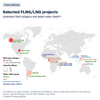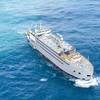Gazprom Neft Completes Okhotsk Survey
Russian oil and gas exploration company Gazprom Neft has completed ecological monitoring of grey whale populations at the Ayashsky license block, offshore from Sakhalin Island, with expedition members registering more than 550 animals in the course of a five-month survey.
According to a press release, the ecological monitoring of grey whales in the Sea of Okhotsk forms part of a joint programme being implemented by oil and gas companies operating in Sakhalin. Gazprom Neft joined the programme in 2017, on starting development of its Ayashsky license block.
Researchers conducted 58 sorties on the Siem Sapphire support vessel between June and October, obtaining more than 30,000 photographs — all of them taken from a special high-speed boat, involving the use of professional equipment at a distance of 600–800 metres from the whales, thus not disturbing the animals.
During the expedition researchers also obtained data on the distribution of underwater acoustic waves — something that will help reduce industrial impacts on whale habitats. Gazprom Neft is already using low-volume vessels in areas where whales congregate, limiting vessel speeds and selecting routes away from mammal feeding grounds.
"Environmental protection and responsible resources management are key priorities in our company’s business. We joined the grey whale monitoring programme immediately on starting operations at the Ayashsky license block, and use the most modern vessels and equipment here. This is one of the most wide-ranging ecology programmes in the industry, and is a prime example of effective collaboration between oil and gas companies in conserving wildlife," said Alexander Korobkov General Director, Gazpromneft-Sakhalin.
Korobkov added: "Observations show the Okhostk—Korean grey whale population — which was, quite recently, on the point of extinction — is now increasing. Monitoring is giving us the opportunity to learn more about these rare mammals, and to make our own contribution to ensuring environmental well-being on the Sakhalin Island continental shelf."













